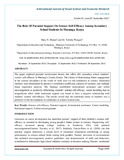| dc.contributor.author | Muturi, Mary, N. | |
| dc.contributor.author | Wangeri, T. | |
| dc.date.accessioned | 2022-11-02T10:56:45Z | |
| dc.date.available | 2022-11-02T10:56:45Z | |
| dc.date.issued | 2022-09 | |
| dc.identifier.citation | International Journal of Social Science and Economic Research ISSN: 2455-8834 Volume:07, Issue:09 "September 2022" | en_US |
| dc.identifier.issn | 2455-8834 | |
| dc.identifier.uri | https://ijsser.org/2022files/ijsser_07__191.pdf | |
| dc.identifier.uri | http://hdl.handle.net/123456789/6143 | |
| dc.description.abstract | The paper explored parental involvement factors that affect 498 secondary school students’ science self-efficacy in Murang’a County Kenya. The choice of determining future engagement in the science disciplines in the world of work rests on self-confidence in science. Inferential statistics were determined by pearson’s correlation coefficient, analysis of variance, and multiple linear regression analysis. The findings established instrumental assistance and verbal encouragement as positively influencing students’ science self-efficacy, career modeling had an insignificant effect while emotional support was found to have a negative relationship with students' science self-efficacy. The results reveal that the emotional status of students was a predictor of the development of confidence in science-related tasks. | en_US |
| dc.language.iso | en | en_US |
| dc.subject | Science self-efficacy, Parental support, Instrumental assistance, Career modeling, Emotional support, Verbal encouragement. | en_US |
| dc.title | The Role Of Parental Support On Science Self-Efficacy Among Secondary School Students In Muranga, Kenya | en_US |
| dc.type | Article | en_US |

